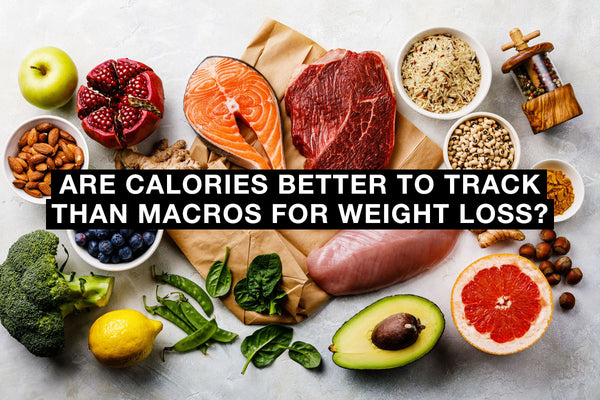It goes without saying that in order to lose weight, you must be in a calorie deficit, whereby energy out > energy in.
Seems pretty simple on the surface, doesn’t it?
Eat less calories than you burn each day for a considerable amount of time, and you lose weight.
Where things get a little more complicated is how you track your nutrition -- should you count calories or track macros?
This is a debate that goes around and around, but the truth is that they’re not diametrically opposed. They are two sides of the same coin.
Today, we’ll discuss the factors that play into whether you should track calories or macros for weight loss.
Are Calories Better to Track Than Macros?
We’ll start off by saying that, to date, there is currently no scientific research that has specifically examined whether counting macros is as effective as other methods for achieving weight loss.
Previous studies have examined whether tracking calories is effective for weight loss (which it is).[1]
Regardless of whether you track macros or calories, though, the truth is that you need to be in an energy deficit to lose weight.
Tracking calories is a more general approach for fat loss that requires a little less effort on your part. All you need to be concerned with is consuming fewer calories than your body requires to maintain its weight.
By merely tracking calories, you’re not concerned with how many of those calories come from protein, fat or carbs.
This method can work for individuals simply wanting to lose “weight.”
However, for the individual interested in losing fat and retaining muscle (i.e. those wanting to enhance body composition), tracking macros is the better option.
The reason for this is that simply tracking calories doesn’t ensure you’ll hit the minimum requirements for protein (which is needed to repair and build muscle) and/or fat (which is required for a bunch of processes, including hormone production).
By tracking how many grams of protein, carbohydrates, and fats you eat each day, you’ll know whether you’re hitting your nutrient requirements to maximize fat loss and muscle gain. And, since muscle loss is a very real possibility when dieting, tracking macros helps make sure you’re consuming enough protein to ward off any potential protein breakdown.
Plus, by tracking macros, you’ll also be tracking calories, since the macronutrients are what make up your calories.
- One gram of protein = 4 calories
- One gram of carbohydrate = 4 calories
- One gram of fat = 9 calories
So, at the end of the day (or even after each meal), you can simply add up how many calories you’ve consumed by tallying up the macros for the meal.
Takeaway
Individuals who consistently track their nutrition (whether it’s calories or macros or both) are most likely to lose weight, keep it off, and experience the greatest success during their transformation challenge.
So, if you’ve experienced success tracking calories, keep doing it. However, if you haven’t gotten the results you wanted to, maybe consider tracking macros and see how that bodes for your success.
Similarly, if you have already been tracking macros, and it’s yielding the results you want, there’s no need to change things up. If tracking specific macros seems a bit too tedious, and it’s easier to just track total calories, then give it a shot, and see how you fare.
At the end of the day, deciding whether to track macros or just total calories is a highly individualistic decision. There is no one blanket answer for everyone in all cases. Choose the method which works best for you and your lifestyle.
Just realize that tracking calories versus macros isn’t all that different -- one just requires a touch more granularity in tracking than the other.
References
- Michele L Patel, Christina M Hopkins, Taylor L Brooks, Gary G Bennett. Comparing Self-Monitoring Strategies for Weight Loss in a Smartphone App: Randomized Controlled Trial. JMIR mHealth and uHealth, 2019; 7 (2): e12209 DOI: 10.2196/12209






